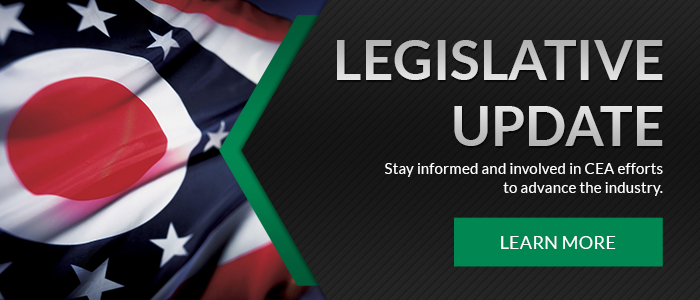Legislative Update - June 2020

As the legislature gets closer to their summer recess, there has been increased committee activity within the Statehouse walls. While they continue to focus on COVID-19 related legislation, many other bills not dealing directly with the pandemic are being heard and passed in committees and by the full Senate and House respectively. If the legislature adheres to their current reported calendars, the House’s last scheduled session date is June 11th while the Senate’s last session date, before they break, is June 24th.
Legislators Continue To Work On Synthetic Urine Ban
SB 156 (Gavarone) which prohibits defrauding an alcohol, drug, or urine screening test received a second hearing in the Ohio House Criminal Justice Committee. At the most recent hearing, CEA provided testimony in support of the bill. (Proponent Testimony). CEA and its lobbying team continue to stress the importance to the construction industry of the passage of SB 156 with members of the committee and legislators in the Ohio House.
State Funding For Construction Projects Enters Final Deliberations
SB 310, a bill originally introduced solely to appropriate $350 million in federal CARES Act funding to local governments to help offset losses due to the coronavirus pandemic, was amended to provide $1.28 billion in Capital ReAppropriations Projects. These dollars are unspent building or equipment project monies from previous state capital bills. Both of these appropriations are positives for the construction sector. The bill now goes to the Senate where the chamber will review various amendments that were added to the bill. One of these provisions ensures Transportation Improvement Districts increase their projections of the use of prevailing wage. This type of funding and the opening of various sections of the Ohio revised code in these large bills are always areas of interest to CEA and our members.
Prompt Payment Bill Gains Another Hearing
HB 380 (Cross, Sweeney) received a fourth hearing recently in the Ohio House Commerce and Labor Committee. CEA previously testified in support of this bill and continues to work with the committee advocating for its passage. The bill requires owners to pay construction contractors within 30 days after the completion of the project.
Repeal Of Prevailing Wage Proposed
As in previous legislative sessions, a bill to repeal Ohio’s prevailing wage statute has been introduced. HB 663, introduced by Reps. Hood and Dean, was referred to the Ohio House Commerce and Labor Committee. This committee has strong pro prevailing legislators on it many whom CEA has worked with over the years. CEA’s strong effort and CEA’s educating legislators have thwarted such attempts to undermine prevailing wage in the past. These strategic efforts will obviously continue.
Unemployment Compensation
SJR 4 (Peterson) would issue bonds to repay unemployment compensation advances -The bill recently received its second hearing in the Senate Finance Committee. According to the sponsor, passage of this resolution will allow the General Assembly to be prepared when the state borrows money from the federal government for Ohio’s unemployment compensation program. This authority will only be used if the state can get a lower interest rate than the federal government offers. If passed, the resolution will be submitted to the electors at the general election to be held on November 3, 2020. If approved by a majority of the electors voting on the proposal, the constitutional amendment takes effect immediately. The bill is up for a third hearing June 9th.
HB 614 (Fraizer, Richardson) Unemployment Compensation - The bill received its fifth hearing in the Ohio House Ways and Means Committee this week. The bill is in response to the struggles the state’s unemployment service program had responding to constituents. The placeholder bill was amended to produce a sub bill. HB 614 sets up a review committee (the Unemployment Council Modernization & Improvement Council.) The tasks are administrative. Reports will be issued by the committee created by the bill and the State Auditor on how ODJFS has run the system.
HB 614 specifically states NOT to look at solvency of the system.
The council shall examine the process by which an individual files a claim for and receives benefits under this chapter, and shall include, but not be limited to, all of the following:
- The technological infrastructure used to file claims and pay benefits and the experience had by individuals and employers participating in the process.
- Possible improvements that will maximize responsiveness for individuals and employers.
- Methods for sharing data across systems related to unemployment compensation to maximize efficiency.
- Methods for synergizing user experience across multiple programs administered or supervised by the director of job and family services.
The bill has the director: providing staffing plans, providing a single contact point for customers creating a complaint form, and standardizing forms for what the general assembly members need to send to ODJFS.
